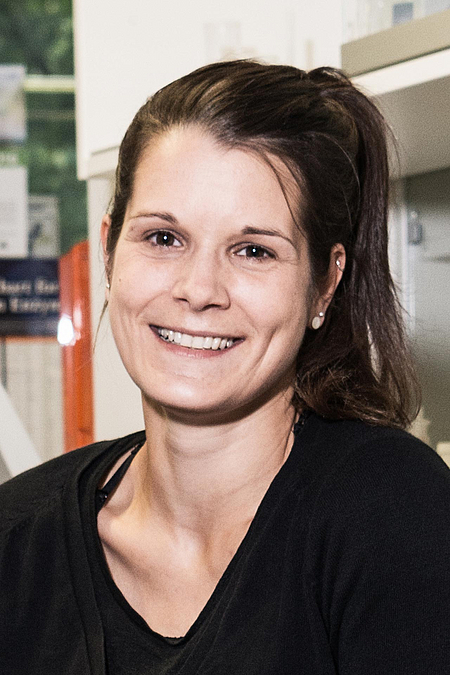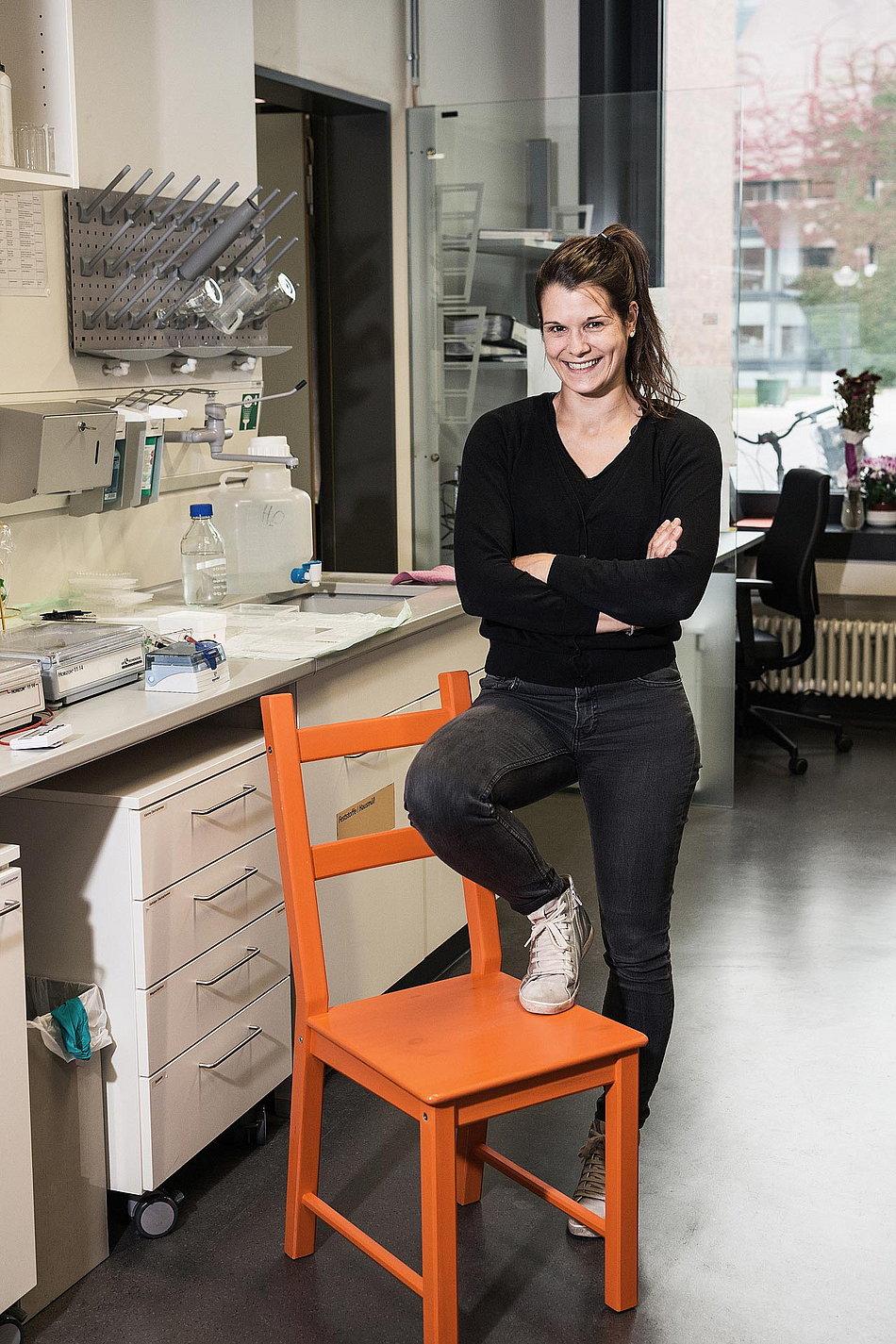Sitting in the auditorium again as a researcher
Where there’s a will, there’s a way: In Jana Marie Schwarz’s case, there could not be a more fitting description of her life path. She came from Ulm to Berlin to do her master’s degree in Molecular Medicine and has since then been researching the potential for disease of DNA sections. But that wasn’t enough for her: since 2015, she’s also been studying Human Medicine at the Charité. While simultaneously running a household with two small children, the rest of her life is spent constantly switching between the auditorium and the laboratory. In this interview, she told us how she got here and what plans she’s pursuing with this unconventional lifestyle.
Dr. Schwarz, a full-time post as a postdoctoral researcher must in fact keep you fully occupied. What made you decide to study medicine in addition?
There are many pediatricians working in my research group, and we’re studying the causes of the genetic, neuromuscular diseases from which patients at our clinic suffer. I’m predominantly concerned with methods for analyzing the high-throughput data generated. However, in the past it used to be the case that I never saw the patients themselves and also did not know how things progressed for them after the analysis. In group meetings, I had the feeling that I only ever got to see one part of the whole picture. As tasks like autonomously leading a study are restricted to medical practitioners, I felt increasingly that my scope of action was very limited. That thought weighed on me for a long time and I finally looked into doing a second degree in Human Medicine. In fact, being a biologist with a PhD and research experience gives you a good foundation for medicine, so I’ve been studying at the Charité again since fall 2015. At first, my colleagues were rather skeptical as to whether the projects might suffer as a result, but it’s my great good fortune that my head of department, Professor Schülke, is very open-minded about unusual careers. Also, in bioinformatics it’s possible to work on projects in between or in the evenings. Meanwhile, it’s clear to everyone that I don’t neglect the projects.
How do you manage to cope with all these tasks?
You have to stop thinking you always have to do everything yourself and be able to delegate tasks. Of course, you still have to work in an efficient way, which isn’t always possible with laboratory experiments. That’s somewhat easier in bioinformatics. Another important point is that I’m very free to arrange my own working times. Also, the Charité is very family-friendly, regarding both staff and students, compared to other universities. For example, you’re allowed to put together your own individual schedule if you have children, and the ProMedikids working group set up by student parents greatly helped me to clarify innumerable open questions before my studies. Having a good arrangement with your partner also helps. Of course, I do get to spend less time with my children than someone who gets home at 4 o’clock every day. But on the other hand, I’m helping them to become independent at an early age. Ultimately, you must also have the courage to “brave the gap”; I simply can’t invest the same amount of time in preparing for exams as other students.
What do you find most inspiring about this life plan?
I’ve made my hobby my job. I feel it’s a privilege to not just feel I’m going to work every morning.

Funding program
Deutschlandstipendium
Funding period
2016 – 2019
Research areas
Medicine, translational genomics
Institution
Charité – Universitätsmedizin Berlin
Since 2015
Medical degree at the Charité – Universitätsmedizin Berlin
Since 2013
Research associate in the NeuroCure Cluster of Excellence of the Charité – Universitätsmedizin Berlin in the working group "Translational Genomics"
2009 – 2013
PhD at the Faculty of Biology, Chemistry, Pharmacy of the Free University Berlin
It’s not that I don’t have any other interests, but I’ve always been goal-oriented and would rather have a full day than be bored. However, I didn’t really achieve that sense of satisfaction until I started my new studies. In the meantime, I’m also increasingly working on more patient-oriented projects, which increases my sense of satisfaction even more.
To walk an unconventional path, what does one need – apart from courage?
I always say: the willingness to be slightly crazy (laughs). If you’re really convinced of something, you have to try doing it. Otherwise, you'll spend the rest of your life accusing yourself of not trying. Of course, there’s no guarantee that everything will work as planned. You do have to have it in you to step into the unknown. I see the funding from the Charité Foundation as recognition for a somewhat unusual life path. Again, it does of course represent day-to-day financial support and effectively relieves me of certain tasks.
What exactly is it about your research field that fascinates you so much?
While doing an internship, I delved into DNA mutations, which led me to the field of bioinformatics. At first, I thought: sequencing, how boring! But the bioinformatics behind it then turned out to be surprisingly exciting. We developed a computer program to predict whether or not a newly discovered mutation can cause a disease. Then, realizing the kind of medical fates that are determined by such mutations was also pivotal for me. In the case of a single rare disease, there’s no large patient collective as there is in the case of more widespread diseases, but there’s always a person and a story behind it.
The combination of bioinformatics and medicine has finally given me the medical knowledge to categorize symptoms and, at the same time, the methodical knowledge to analyze the data from the perspective of bioinformatics. Based on that combination, I can later draw up a suspected diagnosis, carry out the actual diagnosis, analyze the data and subsequently work out possible therapy options in a talk with the patient. For me, it’s important to work with people and not just sit in front of a computer.
Where do you see yourself with this life plan in 30 years’ time?
My dream would be to still be able to have fun doing research for a few more years. After graduating from my studies, I’d like to work as an assistant doctor at the clinic and later complete my training as a medical specialist. After that, I could imagine being employed in a practice. For me, it’s clear that I want to work as a doctor. I’m not just studying in order to conduct great studies. In 30 years, I’d like to have helped lots of patients to get a diagnosis and I’d like to have accompanied them for some way on their path.
July 2017 / MM
